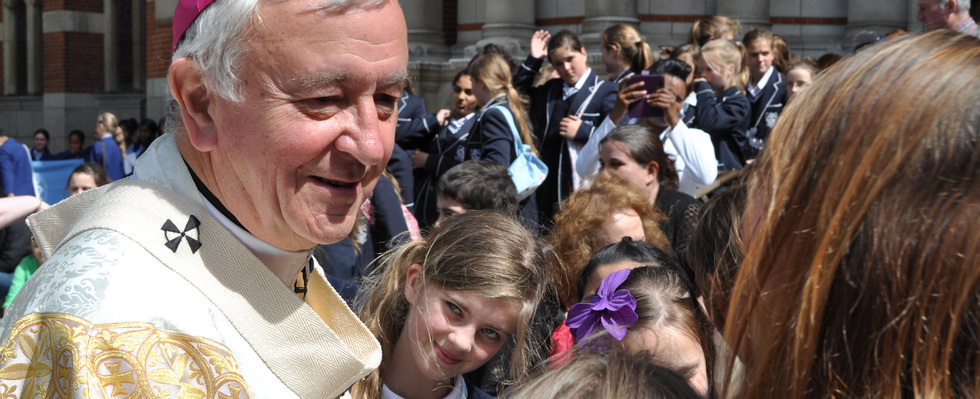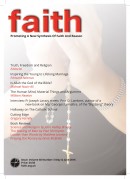Holloway on the Role of the Catholic School
Fr Edward Holloway FAITH MOVEMENT May - June 2016
Holloway on The Role of the Catholic School
This is an abridged version of an Editorial in Faith Magazine for September/October 1972 by the then editor and Founder of the Faith Movement, Fr. Edward Holloway. He was responding to a recently published pamphlet by the Catholic Teachers Federation, ‘Are Catholic Schools Divisive? ’
Home, Tabernacle, School: One Family of God
Let it be clear in all our teaching and preaching about the Catholic School, that we are not asking for them to “keep the children safe” from other faiths, nor to be sure that they will always hear a Catholic rejoinder in the history class. We begin with the home. Education begins there, education in the knowledge and love of God, and his full revealing of himself in Jesus Christ. The home, because it is the focus of values, human and divine, is also the first and primary seat of the right to educate. This is the primary right touched upon by the Catholic Teachers’ leaflet which states basic well-worn Catholic doctrine. They write: “The Church states with the utmost clarity that it has no desire to remain away from the world in a state of isolation. Christian education is in the world and for the world ... man must work out his salvation in the concrete situation in which God has placed him; not by protection but by contributing to the whole human community of which he is an integral and inseparable part ... parents, who have the first and the inalienable right and duty to educate their children, should enjoy true freedom in the choice of their schools, etc.”
The spiritual life of a man intertwines with his cultural life, and profoundly influences that cultural unfolding. The formation of the home leads quite naturally to the local parish, Tabernacle of God with men, around which the local family of God gathers for the common life in Christ of the Eucharist, Sacrifice and Sacrament of the world. The argument is not changed when the Catholic school is inter-parochial, for it is the same Lord and God in all the parishes of any catchment area, whether the school be junior or senior. The parish unit will never lose its function and relevance in the Church, any more than the family will, but in the modern world with its wider interchange, it will become increasingly an organism in the wider grouping of the district, just as the district, through the pastoral centre, will become more aware of itself as an organic member of the diocese. This is true developmental progress, ardently to be desired and sought just now.
The State not Neutral
We are asking for the right to educate a generation which, from the beginning of its school life, is going to be profoundly trained in the wisdom and love of Christ in the Catholic school. Now, just as this process must begin in the home, so must it continue with the primary and the middle school, and it is greatly to be desired if it can continue on into the modern senior comprehensive, notwithstanding the enormous costs involved. We are realists, we will do our best, but the People of God number many weak, apathetic, confused and carnal members. We cannot achieve miracles where the home background does not help us. We can love, cherish and care for, with a fierce compassion, those children whose family background deprives them from their cradle, and neither do we condemn their parents, whose human spirit has often been itself blasted and crucified before its adolescence. We love them, so does Christ, and we will try. So does Jesus Christ.
The Catholic school is not “divisive” in this respect, except in the sense in which Christ is “divisive” and said he would be, in as much as his teaching was a challenge, and the loyalty he called for overriding. We do not apologise for this challenge and this loyalty, nor for the teaching of Christ. The Humanists, or the militants among them, and the neo-modernists who run by their side, are the most active in calling for the abolition of “divisive” schools. The same people, where the permissive society has not yet reached its extreme limits in the granting of generalised drug use, abortion on demand or housing aid for married homosexuals, and what have you, will demand all of these things in the name of the “free cultural exchange of the plural society”. Very well then, they are hoist with their own petard: we demand and defend our Catholic schools in the name of the same cultural and personal freedoms, within a very “plural society”.
It is nonsense to suggest, and honest people know it, that the religious formation of the local authority school is an adequate Christian spiritual formation, even in the primary schools. There is a total confusion in doctrine, a variety of practice and a generalised belief that a general inculcation of “all things bright and beautiful” is enough. In the middle and senior schools, the State-school religion passes over into embarrassment, farce or plain general debate. The State cannot be blamed for this. The State school must reflect the general common denominator of the wishes and expectations of society at large, while upon these general expectations the intellectual and cultural leaders who write many of the textbooks, especially those which are optional, but on the “passed as suitable” list, will push a little more in a Humanist or anti-institutional Christianity direction. The writer, as parish priest, has read such optional textbooks from Catholic schools in his own area, and is not making comments without actual knowledge.
The State in fact cannot be neutral. The very decline of the influence of the Christian Church, itself partly due to failure to find a new synthesis of faith and reason, and then to live it in fervour of spirit, has thrown increased formative responsibility upon the State. The very Humanists who have so often denied the right of the Church to “indoctrinate” are not slow to rush in to do exactly this, in the name of a new age, and the formation of a generation who will enable mankind to survive, etc, etc. It comes over in all the modern debates—economic development and resources, use of environment, pollution, population, the “doomsday” debates. It comes over just as significantly, and with much more direct indoctrination, in school programmes upon sex, love, and marriage and human relationships, upon attitudes to drugs, race and religion.
Even politics cannot be ruled out any longer. The modern child is very alert mentally, and among the middle classes especially, very sophisticated and adult for his age. The very pluralism and agnosticism of the society they live in makes modern children keen and earnest questioners when they pass into the middle and senior schools. The senior schools are adult colleges in fact. Nowadays, it is they, the pupils, who take over the pace and the direction of every human discussion and question, from the pressures of their need, and the vitality of their keen young minds.
We are asking the right to teach, preach, form and evangelise. We have a very tough proposition upon our hands, and our theological teaching will have to be a darned sight better than in the past. These young adults do not need the Humanists, the Modernists or anybody else to protect them from priests, teachers and parents. In general, they are exquisitely sincere, wonderfully kind and very honest, even about their weakness and their plain intention to enjoy their sins. They present us with a chance and a challenge, a heartbreak, and a searching knife which peels away our own insufficiency. We should cling to this chance, and demand it in the name of human and parental rights, but these children cannot, in a Catholic school, be “sheltered” from the world outside!
The School and the World
In the stormy sea of modern life, the Humanist (he used to be called the Rationalist) and the generalised agnostic is as much tossed on the waves as we are. We are not going to let him take our schools from us on the pretence that they are divisive, when the “Little Red School Book” and many another such publication, proves that self-division cuts our poor, modern society not just in two, but in many pieces. We demand our right, as a coherent community still, to put our case and form our young. We will not be able to do it, unless the case itself appeals, and takes root, and makes disciples. We know that. While our schools will need to be a lot better than they were, in terms of spiritual and intellectual power, thirty years ago, we will also need a theological formation much better than the nebulous waffle which has passed for formation in catechetics this last ten years. Many young men and women of 18 today have told me that they have had no definite teaching in their faith since the age of 12 ... just endless sociological dialogue. Of course, if that were all the Catholic school had to give, we would hardly have a spiritual or cultural case, but we have much more to give, and you will find its outline, for all ages, in the General Catechetical Directory.
The argument that the Catholic school is in some way anti-ecumenical is plain nonsense, of course. We must have, in the pulpit and in the school, and also in the home, definite, full, doctrinal and spiritual formation to give wisdom and fulfilment, but the whole tenor and atmosphere of the Church since the end of the Second Vatican Council means that a negative approach to other churches, other faiths, other people is now totally impossible. We seek true ecumenism, and its foundation is full faith, deep charity and tremendous personal, spiritual effort to live the integrity of Christ in morals, as well as in faith. This is why we want the Catholic home, the Catholic school, and far more good, holy and balanced vocations to the priesthood of Christ.






